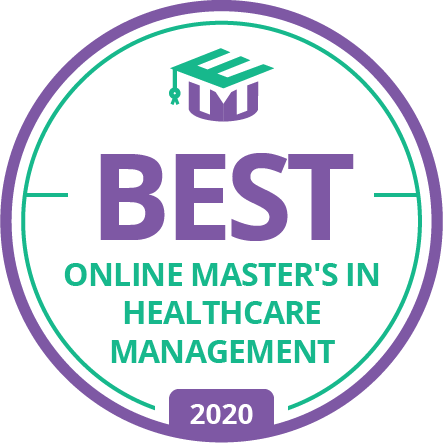M.S. in Health Care Management
Our Healthcare Administration Degree is Offered Online
Admissions into the MS in Health Care Management Program has been suspended due to restructuring.
We are proud to share that we have just been named a top online health care management program by the health education website, EduMed.org. Learn more.
Health professionals can advance in their careers and enhance the value they bring to their current organization with our Master of Science in Health Care Management (MSHM). This fully online program builds upon the experiences of current health professionals by strengthening competencies in management, leadership, strategic planning, finance, quality assurance, informatics, legal compliance and ethics. The program is offered part-time, allowing students to work full-time while pursuing an advanced degree. We offer three specialized tracks: Management and Leadership, Psychiatric Rehabilitation, and Health Care Informatics.
According to the U.S Bureau of Labor Statistics, the need for medical health service managers is expected to grow 17 percent through 2024. An advanced degree will enable graduates to accelerate their careers in one of today’s fastest-growing occupational fields.
The Healthcare Management Master’s program offers three specialized tracks:
- The Healthcare Informatics Track is offered jointly with the Department of Health Informatics. Courses in this track cover the methodologies behind health informatics applications, introduce biomedical data analysis, and provide an overview of the concepts, techniques and software used in clinical decision-making. After completing the master’s program, students have the option to continue on to earn a graduate certificate. Credits earned during the master’s program can be applied to the certificate. Learn more about the Healthcare Informatics graduate certificate.
- The Management and Leadership track is designed for wide range of health professionals. This track is especially suited for current or aspiring healthcare supervisors and managers who are seeking to broaden and deepen their management and administrative skill-set. The track offers an ideal blend of structure and flexibility, combining foundational course requirements related to management, leadership, finance and strategic planning, as well as an extensive choice of track courses and electives.
- The Behavioral Health track is for managers and supervisors in the mental healthcare service system. They gain the knowledge and technological skills to ensure resources are managed effectively, and program and patient outcomes are achieved. Experienced faculty guide students through coursework on management, leadership, finance, strategic planning and evidence based & promising practices in Behavioral Health.
- The Gerontology track allows students focused on working with the aging population to gain a healthcare management experience. Five core courses include topics such as healthcare management and leadership as well as financial management in healthcare. The student also completes five courses specific to gerontology. Topics include social and healthcare policy for the older adult and long term care administration. These courses will allow the student to gain a deeper understanding of healthcare areas specific to the older adult. The courses in the track allow the healthcare manager to deepen and broaden skills in areas that affect the older adult. The final two courses in the curriculum are related to the curriculum project. The project will enable the student to apply concepts and theories covered in the program courses.

The program is unique in offering:
- Four specialized tracks:
- Management and Leadership
- Biomedical Informatics (in cooperation with the School of Health Professions Department of Health Informatics)
- Behavioral Health
- Gerontology
- Convenience of entirely online course offerings
- Potential to matriculate into a doctoral degree program
- A highly structured capstone, graduate project
- Growing network of successful alumni
- Outstanding program faculty with extensive experience working in large healthcare organizations
- Enrollment in a university ranked #1 nationally by College Factual in best colleges for health professions.
Learning Outcomes for all tracks are aligned with the School of Health Professions Outcomes and include outcomes related to major competencies for health care management. Learners will be able to:
- optimize overall quality outcomes in health care;
- achieve professional competencies as currently defined by health care organizations and professional associations, including: strategic planning, health care finance, management and leadership, legal and ethical considerations, as well as other similar competencies;
- effectively communicate in oral, written, and technical formats;
- communicate and collaborate with health care team members and other stakeholders to attain a common goal
- and effectively access, store, evaluate and apply scientific, health care and patient/client information, while respecting the ownership and privacy of sources, to help solve real-world challenges of health care organizations.
According to the U.S Bureau of Labor Statistics, the need for medical health service managers is expected to grow 17 percent through 2024. An aging population means a higher demand for skilled managers in settings such as hospitals, physician’s offices, nursing homes, residential care facilities, home health care, outpatient facilities, the insurance industry, and community healthcare agencies. An advanced degree will enable graduates to accelerate their careers in one of today’s fastest-growing occupational fields.
Rutgers is accredited by the Middle States Commission on Higher Education (MSCHE), a voluntary, nongovernmental, peer-based membership association dedicated to promoting standards of excellence and improvement in higher education.
You are invited to a Virtual Information Session to explore degree programs from the Rutgers School of Health Professions. Please register in advance to receive the Zoom link.
- Application deadlines: Summer deadline is April 15 ; Fall deadline is March 1 ; Spring deadline is November 15
- Minimum of a bachelor of science degree with an overall GPA of 3.0 or greater
- A minimum of two to three years full-time experience working in the healthcare industry
- Two letters of recommendation using the Recommender Form
- Structured personal statement
- Official transcripts from all academic institutions attended
- Resume/CV
- Completed application
- Payment of application fee
A two to four-page personal statement of career interest and relevancy of MSHM program to achieving professional goals. Essays must address all the following points:
• How the applicant found out about the program and what attracted them to apply to this specific program.
• Why the applicant is interested in pursuing a master degree in health care management and how previous education and career experiences have prepared them for it.
• What attributes and accomplishments strengthen the applicant’s candidacy, but may not be evident from letters of support, transcripts or other elements of the application package.
• A description of how at least three of the health care management skills/competencies covered in the curriculum apply to the applicant’s current career in health care.
• The last “course” in the program that students take is a capstone project known as “Graduate Project,” where students are required to synthesize and apply the knowledge/skills they have acquired in the program. Students often pursue a work- related project in the areas of process improvement, strategic planning, among many others. As such, applicants should describe a general overview of, and preliminary ideas for, the type of project(s) they may be interested in conducting for the Graduate Project.
• The essay should also describe plans which the applicant has for utilizing the degree and the knowledge/skills acquired from the program, to help achieve long term career goals.
Applications are accepted on an ongoing basis for the fall, spring and summer semesters. The deadline to apply for the fall semester is March 1; spring semester is Nov. 15; and summer is April 15. Individuals may take up to 12 credits in the program as non-matriculants prior to application to the program.
For Tuition and Fees, please see the Graduate Tuition and Fees.
(Scroll down to 2023-2024 Rutgers Health Tuition and Fee Rates and click on School of Health Professions)
The Master of Science in Health Care Management is a 36-credit program consisting of the following:
- An 18-credit core of courses [6 courses*]
- Four specialty tracks*
- A 6-credit capstone graduate project
- * Gerontology Track :15 Core credits, 15 specialty course credits & 6-credit capstone graduate Project
We prepare experienced mental health and rehabilitation professionals to become supervisors, managers, and quality improvement professionals in behavioral health roles that professionals with graduate degrees are often called upon to perform in the field of mental health care delivery. The course of study emphasizes the leadership skills needed for advancement to administrative and supervisory positions. This includes classes in management, supervision, organizational and program development as well as a firm background in the empirical basis of psychiatric rehabilitation.
In addition to the core requirements of the Masters of Science in Healthcare Management, the Behavioral Health Track courses include important content about the practices that promote recovery such as:
- Psychiatric Rehabilitation
- Evidence-based and Promising Practices
- Wellness & Recovery
This graduate program emphasizes health services management competencies. Students will develop the skills to effectively lead and manage within the complexities of the health care industry.
Graduates will be prepared to assume rewarding and highly demanding leadership and management positions within the health care industry, including serving as clinical department directors and managers, hospital administrators, as well as a variety of health care regulatory and governmental oversight positions.
- Minimum of a bachelor of science degree with an overall GPA of 3.0 or greater
- A minimum of two to three years full-time experience working in the healthcare industry
- Two letters of recommendation using the Recommender Form
- Structured personal statement
- Official transcripts from all academic institutions attended
- Resume/CV
- Completed application
- Payment of application fee
Applications are accepted on an ongoing basis and you may apply online here.
Subject to approval, up to 12 credits may be taken on a non-matriculated basis. The non-matriculated registration can be found here.
Yes. The best source for financial aid information is at the Rutgers Student Financial Aid Office. Call 973-972-4376 or click here.
There are limited scholarships available for SHP students. General scholarship information can be found by clicking here. In addition, individuals should look for third party opportunities such as those scholarships offered through the American College of Health Care Executives (ACHE) and the New Jersey Hospital Association (NJHA).
Questions? Please give us a call with any questions you have about the program.
- Office of Admissions: 973-972-5454
- Department of Interdisciplinary Studies, Healthcare Management: 973-972-8576

To learn more,
email Program
Director
Janet Reid-Hector



